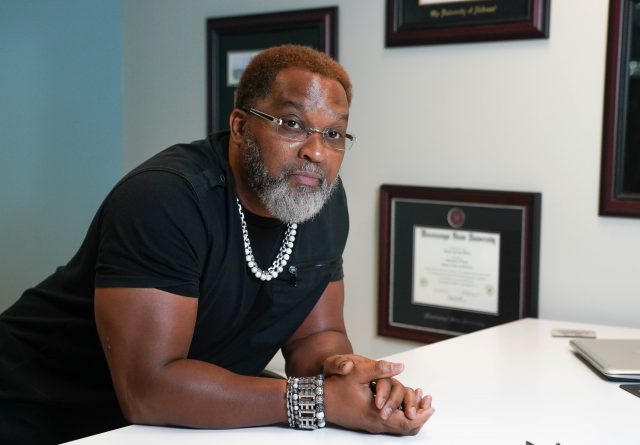
By Haley Wilson
The Birmingham Times
J.C. Wells, a licensed professional counselor with the Birmingham-based Without Walls Counseling Services, recently spoke to The Birmingham Times about mental health awareness and the Black community, which is at the forefront this month.
July is National Minority Mental Health Awareness Month and the perfect time to start those conversations. Formally recognized in June 2008, [this month is devoted to bringing] awareness to the unique struggles that underrepresented groups face in regard to mental illness in the U.S.
The Birmingham Times: Why is it important to take July as a month to highlight minority mental health awareness?
Wells: “I think Minority Mental Health Awareness Month matters because all of my life and through all the generations before me, it has been taboo to discuss mental health. … In the Black community, there’s a saying: ‘Pray about it, and let God have it’—and that’s it. That’s the model most of us in the Black community have lived by; it has made its way into Black communities, and we are seeing the effects of that model not working. It is absolutely critical to alert and alarm communities that it’s OK to seek counseling; it helps, and it does matter. We have to be able to do more than just pray.”
Why do you believe there is a stigma in the Black community about therapy?
“I was raised in a home where we were told, ‘What happens in this house stays in this house.’ Whenever a person lives by that model, if he or she is suffering through trauma in the house, there is nowhere to take that trauma because they can’t take it anywhere else. [If you do], you feel like you have abandoned and disrespected the rules of the house. Then we grow up and live under those same rules as adults. Everybody wants to be a strong person. In reality, though, a strong person is someone who is able to face their fears, face the things that bother them, and say, ‘Hey, this is what my issue is, but I’m willing to face it.’ I think we have this misinterpretation of what it is to be mentally strong. It really just takes breaking down to somebody and getting the help you need.”
We’re still experiencing social injustice. We’re still dealing in many ways with the pandemic. People have lost loved ones, and some may be hurting. Why do you feel like it’s important now to take care of our mental health?
“As a minority culture we are under more pressure, … so things like taking care of mental health become that much more critical. We have been affected by social injustice more than [any other group], based upon the numbers. As a result, mental health should be higher on the bar when it comes to us finding ways to be well and be better prepared to fight the problems we are facing. … If we are going to meet our destiny as a people, mental health has to come into play.”
As a licensed professional counselor, what are some common themes you hear discussed when people come in for counseling?
“I speak solely to African Americans, and 99.9 percent of things that drive us to counseling is childhood trauma. When you deal with African American communities, whether it be through a marital counseling session or be an individual counseling session, you sometimes find that many people had parents who were too strict and had too much control over the children in the household, for instance. When those children become adults, they are still viewed as children in the eyes of their parents. That can have an impact on their marriages and their ability to parent their own children. It also can create a very tough boundary that drives people into counseling to repair their marriage, repair themselves, or both.”
What are some things you see that you no longer wish to see when it comes to mental health?
“One thing that bothers me is this mindset: ‘My mental health is not important, and if costs me I don’t need it.’ … If you can pay $80 to get your weave done, you can pay it for therapy. Take that money and do something that’s going to do far more for you than some weave. Tend to your mental health and start on your way to healthy living, … especially now, when there is even easier access to mental health.
“One of the benefits of the COVID-19 pandemic to me is that is has made mental health resources more readily accessible via virtual platforms, so many more African Americans have come forward to seek mental health help. Because of virtual platforms, they don’t have to step into the office, so many of them don’t see getting counseling as ‘violating the rules of the house.’ They don’t actually have to step into an office to get counseling, so nobody knows.”
Do you have any personal resources for maintaining a stronger mental health?
“Exercising, for sure. … Also, prior to counseling, taking time to self-reflect. If you have faith—and when I say faith, I’m not talking about religion; I’m talking about a relationship with something that is higher than you—and that is important to you, then you should be diving into those things. For me, that is God.”
Would you like to add anything?
“If mental health is going to change from being a taboo, it has to be treated the same way we treat other health issues. When you see a medical doctor and are diagnosed with, say, diabetes, you are given medication to take on a daily basis. Most people walk away from that doctor’s appointment and get a prescription filled. … What we’ve got to do as a people is treat mental health the same way and get mental health treatment, such as therapy, counseling, or other resources, [including] exercise and meditation.”
Wells can be reached at 2100 A Southbridge Pkwy, Birmingham, AL 35209 (205) 777-5855 or visit www.withoutwalls-counseling.com
This article is being re-published to correct the source of the interview.




